Go back
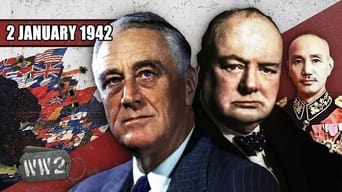
Week 123 - The Formation of the United Nations! - WW2 - January 2, 1942
Episode number: 1
Overview: At the ongoing Arcadia Conference, 26 nations sign the Declaration of the United Nations. Otherwise it is very much a week of motion and changes in motion: in the USSR the Soviets are on the move in the center and the Crimea, the Japanese are slowing their movement in China, the Americans are finishing their movement in the Philippines, and the Axis are moving backward in North Africa. The Luftwaffe also decides that Malta must be eliminated as a base for the Allies.
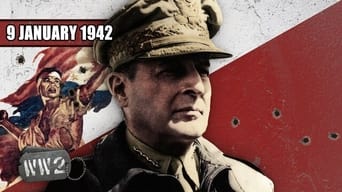
Week 124 - Washington DC Abandons The Troops in the Field - WW2 - January 9, 1942
Episode number: 2
Overview: The US government realizes that it cannot send help to relieve the US and Filipino forces in the Philippines, but it does not tell those forces. Meanwhile in the USSR, a huge Red Army offensive against entrenched German forces begins along the entire frontline. The Germans have pulled back in North Africa, though, to consolidate. The Japanese enter Manila and advance in Malaya, but are forced to withdraw in China.
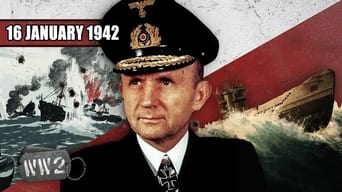
Week 125 - German U-Boats to Strike New York - WW2 - January 16, 1942
Episode number: 3
Overview: Operation Pauchenslag, long-range German submarines operating just of the US Coast, kicks into action this week, as does the Japanese invasion of the Dutch East Indies. They also take Kuala Lumpur. Meanwhile, the Soviet Red Army offensive all along the Eastern Front has its first full week of action, with the Soviets making some real territorial gains in the center, though a German offensive in the Crimea catches them off guard.

Week 126 - The Formalization of Extermination - The Wannsee Conference - WW2 - January 23, 1942
Episode number: 4
Overview: Nazi Germany's "Holocaust by Bullets" has already claimed over a million lives over the past 8 months; this week German authorities hold a conference to streamline and systematize the process of extermination. Gas will now be the preferred method of murder. The Japanese are murdering Allied soldiers that fall into their hands as they advance ever closer to Singapore. The Soviet offensive continues along the entire Eastern Front, but the orders and objectives grow ever more confusing and chaotic. In North Africa, Erwin Rommel launches a surprise offensive against the Allies and make a lightning advance the final two days of the week.
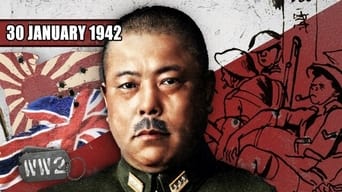
Week 127 - Fortress Singapore Stands Alone! - WW2 - January 30, 1942
Episode number: 5
Overview: The Japanese advance on Singapore has gotten close enough that the British have destroyed the causeway to Singapore Island. The Japanese are also making attacks in the Solomon Islands, Burma, the Philippines, and the Dutch East Indies- their threat to Australia is real. Erwin Rommel's surprise spoiler offensive in North Africa takes Benghazi, and on the eastern front the Soviets break a hole in the German lines in the north even as the temperature drops to the -50s.

Week 128 - Pearl Harbour Avenged! - WW2 - February 6, 1942
Episode number: 6
Overview: The Japanese advance in Burma and the Dutch East Indies, but they've reached the end of the Malayan Campaign- Singapore, which they have under siege. They now prepare for the final assault. The Allies are going on the offensive at sea, though, in the Marshalls-Gilberts Raids, while on land in the Soviet Union the Red Army launches another series of offensives against the Germans.
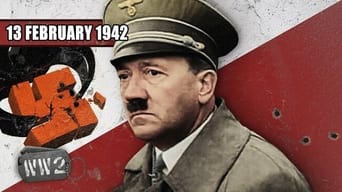
Week 129- German Army Surrounded: You Did Nazi That Coming! - WW2 - February 13, 1942
Episode number: 7
Overview: The Soviet Red Army has managed to surround some 100,000 German soldiers in the Demyansk Pocket. The Allies are surrounded in Fortress Singapore and the Japanese spend the week breaking in. The Allies are also unable to supply Malta by ship because of continuous heavy Axis bombing of the island and its surroundings, which bodes ill for Allied operations in North Africa. The Germans also make a bold naval move this week- sending two capital ships right up the English Channel under British noses, making for German ports.

Week 130 - Britain's Worst Defeat - Singapore Falls - WW2 - February 20, 1942
Episode number: 8
Overview: The most humiliating defeat in British history according to Winston Churchill- 80,000 men lost as prisoners of war! Humiliated by an enemy far less numerous than themselves! There are many ways to describe the fall of Singapore; these are but two of them. The Japanese are also bombing Australia and invading Sumatra, Bali, and Timor this week, so they are certainly not resting on their laurels. Meanwhile in the Soviet Union, thousands of Red Army paratroops are dropping behind German lines.
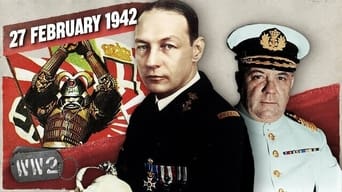
Week 131 - Japan Destroys Allied Armada in Biggest Naval Battle in Decades - WW2 - February 27, 1942
Episode number: 9
Overview: The Japanese are advancing in the Dutch East Indies and Burma, brushing aside defenders, but their biggest victory this week is at sea, when they not only brush aside the ABDA Fleet, but literally wipe it out of existence. Meanwhile Italian and Germans submarines are patrolling the Caribbean, sinking any Allied merchant shipping they find. It is yet another week of Axis successes.

The Japanese Raid Australia and the British Raid France - March 6, 1942
Episode number: 10
Overview: The Japanese advance in Burma continues, threatening Rangoon, and also make landings on Java and New Guinea. They even go so far as an air raid on Broome, Australia. The British are making raids of their own this week, Operation Biting against Bruneval in German-occupied France. As for the Germans themselves, 100,000 of them are still surrounded by the Red Army at Demyansk, and Hitler is told that the Soviets might have enough reserves to defend against a renewed summer offensive.
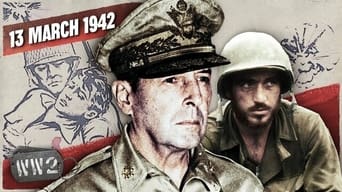
Week 133 - Tumbling Capitals - MacArthur on the Run - WW2 - March 13, 1942
Episode number: 11
Overview: Rangoon in Burma falls to the invaders without a shot, the Dutch East Indies surrender 100,000 men to them at Batavia, and the Japanese land on New Guinea and begin their advance on port Moresby. The first phase of their offensives is now over. The Philippines still hold out, their armies under siege at Bataan, but Douglas MacArthur, Allied commander there, has made his getaway, one day to hopefully return. American troops do begin landings on New Caledonia, to build a base there to begin the fight back.

Week 134 - Crap Tactics in the Pacific - Shall MacArthur Return? - WW2 - March 20, 1942
Episode number: 12
Overview: MacArthur makes one of the most iconic remarks of the whole war, but considering the fact that the Philippines seem unsalvageable, it's pretty unclear just how he'll do it, especially since even though ever more American soldiers are arriving in Australia, the Japanese threat to Australia grows daily. Bill Slim arrives in Burma to take command of I Burma Corps, and Joe Stilwell has taken over two Chinese Nationalist armies, so the defense of Burma looks like it might go on a while longer, though the Allies are at a serious disadvantage after losing Rangoon. The Japanese, for their part, are trying to figure out how the heck they're going to administer all the territory they've taken this year and bring natural resources to Japan itself. There is still scattered fighting in the USSR, but the spring muds have put pad to any major offensives for the time being. As for the British, they launch Operation Outward, a hydrogen balloon campaign over Germany.
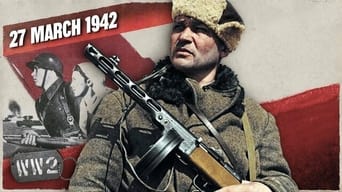
Week 135 - New Blitzkrieg Against a Wall of 9 Million! - WW2 - March 27, 1942
Episode number: 13
Overview: The Allies make plans to bring the war to Germany by possibly attacking in North Africa. Holding Malta might be the key to such adventures, but it is increasingly harder to do. The Soviets and German make plans for adding millions of soldiers to their ranks, while springtime mud has kept the front mostly quiet. The Japanese plans for the conquest of Burma are still advancing, though the fighting this week is especially brutal.

Week 136 - The Carpet Bombing of Germany begins - WW2 - April 3, 1942
Episode number: 14
Overview: Britain's campaign to firebomb the old towns of Germany where civilians reside begins in earnest this week. The British also destroy the port at St. Nazaire in commando action. In the Indian Ocean, however, they are avoiding contact with the Japanese, even while on land the Japanese advance in both Burma and New Guinea.
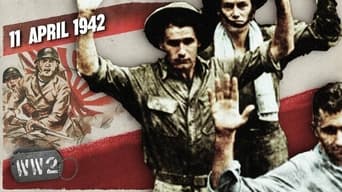
Week 137 - America Surrenders - The Fall of Bataan - April 10, 1942
Episode number: 15
Overview: After holding out since the beginning of the year, the American and Filipino defenders at Bataan can do so no more, and they surrender to the Japanese- the Bataan Death March for the 75,000 prisoners begins. Meanwhile, the Japanese carrier fleet launches a raid on Colombo and shipping in the Bay of Bengal, wrecking Britain's Eastern Fleet in the process and forcing them to move to African coastal bases. Adolf Hitler issues the directive outlining his plans for a summer offensive against the USSR that aim south toward the Caucasus.

Week 138 - America Strikes Back - Tokyo in Flames - WW2 - April 18 1942
Episode number: 16
Overview: The Doolittle Raid is just a little bombing raid over Tokyo that doesn't do that much physical damage. It does, however, have big repercussions- partly in terms of future offensive plans for the Japanese fleet, and partly in terms of the thousands of Chinese lives taken in reprisals for allowing the US bombers to land in China. There is small scattered action on the Eastern Front, more Japanese advances in Burma, and a French VIP escapes captivity in Germany and heads for Switzerland and freedom.
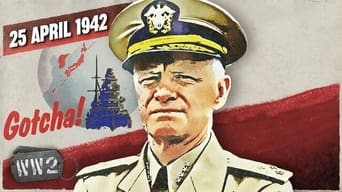
Week 139 - Allied Intelligence cracks Japanese codes! - WW2 - April 25, 1942
Episode number: 17
Overview: After last week's Doolittle Raid on Tokyo, pretty much the entire Japanese fleet is sent out looking for American ships. They do not find them, but the enormous amount of radio traffic they generate is a treasure trove for Allied codebreakers to work on. The Allies ship 46 British Spitfire planes to Malta... and all of them are destroyed by the Axis within 48 hours. Germany begins bombing tourist and cultural destinations in Britain, and to make things even worse for the British this week, they realize they can't hold Burma and are now making tracks for India, with the Japanese Army in hot pursuit.

Week 140 - Japan - One Battle from Victory? - May 2, 1942
Episode number: 18
Overview: Now Burma and control of the Burma Road have fallen to the Japanese. Can nothing stop them? The Allies are thinking about maybe using the Solomon Islands as a base to build to try and fight back, but to do that they'll need control of the Coral Sea, but both sides are sending warships there since the Japanese plan to take Port Moresby. The Allies are aware of this, however, since they have the advantage of being able to read a substantial part of Japan's radio traffic. It is a week of foreshadowing not just there, but also as the Allies send ships to take Madagascar from the Vichy French and the Soviets prepare to launch an offensive in the south of the Eastern Front.

Week 141 - Carrier vs. Carrier - The Battle of Coral Sea - WW2 - May 9, 1942
Episode number: 19
Overview: This week sees a major clash between the naval forces of the Japanese and the Allies. Both sides take big damage, though on the tactical level it is a victory for the Japanese. Operationally, however, they must postpone their attacks towards Port Moresby. They are busy making plans all the while, though, for their upcoming attack against Midway Atoll in the Central Pacific. They also finally have success ending an offensive this week with the conquest of the Philippines when Corregidor falls. Japan's ally Germany begins an offensive of their own this week on the Kerch Peninsula. The Allies, for their part, launch an offensive of their own this week against Vichy French-held Madagascar, and they take the main port, Diego Suarez.

Week 142 - Joseph Stalin Jumps the Gun - May 16, 1942
Episode number: 20
Overview: The Soviets pre-empt a German offensive with one of their own in the south of the Eastern Front, but that's not the only fighting. The skies over Malta and the waters of the Gulf of St. Lawrence are full of action. Meanwhile, two races against time - and the Japanese - come to an end in India.
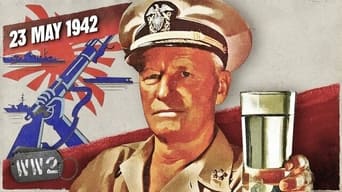
Week 143 - AF is short of fresh water - WW2 - May 23, 1942
Episode number: 21
Overview: Soviet Foreign Minister Molotov arrives in London to meet with Churchill, but at home in the USSR the Germans have launched an instantly successful offensive. In North Africa and Malta the British are building up, unaware that Erwin Rommel is just about to strike, and an American ruse discovers secret Japanese attack plans.
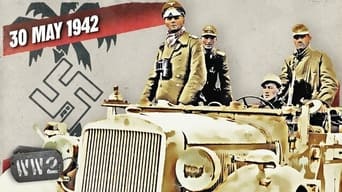
Week 144 - Rommel's Desert Dash - The Whole Bloody Afrika Korps! - Gazala - WW2 - May 30, 1942
Episode number: 22
Overview: Erwin Rommel begins his surprise new offensive with "Rommel's Moonlight Ride", bringing all of his mighty mobile units to the fray in North Africa, while in the Pacific, dozens of warships and tens of thousands of men set sail from Japan- their mission? Attack the Aleutian Islands and Midway Island, but above all, destroy the US Pacific Fleet!
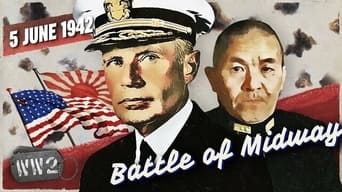
Week 145a - Midway, pt.1 - Clash of the Titans - June 5, 1942
Episode number: 23
Overview: The supposedly surprise Japanese operations against Midway Atoll and the Aleutian Islands kick-off, but they don't know that Allied intelligence has cracked their codes. As the Japanese fleet advances in the Central Pacific and Japanese planes bomb Midway, the US Navy has a big surprise waiting for them.

Week 145b - Germany to Strike Strongest Fortress in the World - WW2 - June 6, 1942
Episode number: 24
Overview: Midway isn't the only fight right now. Germany is trying to crack the mighty fortress of Sevastopol and take the whole Crimea. In North Africa, Rommel is routing the Allies, but in Malta the arrival of ever more fighter planes bodes well for the Allies.
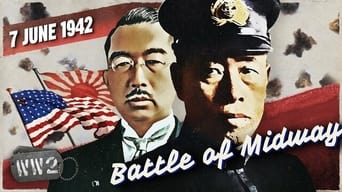
Week 145c - Midway pt.2 - A New War? - WW2 - June 7, 1942
Episode number: 25
Overview: We left off last time with several burning behemoths. Watch today to see the action that follows, not just on the high seas, but also in Alaska. We also turn to Washington DC and Tokyo and follow the reaction to the Battle of Midway there. The Japanese one may surprise you.
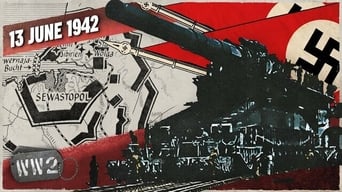
Week 146 - Sevastopol Must Fall! - WW2 - June 13, 1942
Episode number: 26
Overview: It's a week of starts and stops. The Battle of Sevastopol kicks into high gear, and the Battle of Gazala enters its third phase. And what is going on in the Pacific just one week after Midway?

Week 147 - Tobruk: A second siege? - WW2 - June 20, 1942
Episode number: 27
Overview: Two convoys head from opposite ends of the Mediterranean to supply Malta, hoping to run interference for each other, and the Battle of Sevastopol continues as the Axis slowly wear down the Soviet defenders, but the big news is Erwin Rommel's continued advances in North Africa, defeating the 8th Army again and again. Can the Allies hold Tobruk? Will they even try? Watch and find out.
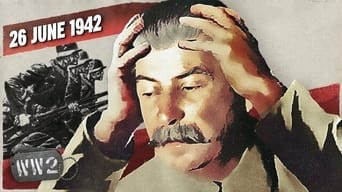
Week 148 - Fall Blau Starts...or Does it? - WW2 - June 26, 1942
Episode number: 28
Overview: Fall Blau, the huge Axis summer offensive in the Soviet Union, is supposed to being this, but is postponed to next. The smaller Operation Fridericus II does begin though, and what dos Josef Stalin make of that and the intelligence he's received? Meanwhile in North Africa, after the fall of Tobruk, the British 8th Army gets a leadership change, but Erwin Rommel is still on the move eastward into Egypt. Where will the Allies try to hold him? Half the world away, the Allies begin to establish a base at Milne Bay, New Guinea. It's a start, a small one, but a start.
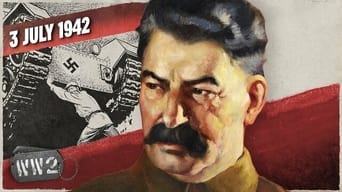
Week 149 - Fall Blau Begins, Stalin Caught off Guard Again - WW2 - July 3, 1942
Episode number: 29
Overview: It's that time of the year again- the time when the Axis Powers drive deep into the Soviet Union. Fall Blau is the name of this year's huge offensive, and it begins this week, making great gains from the very beginning, but the Axis Powers are also making big gains this week in North Africa, taking Mersa Matruh and pushing to within 100 km of Alexandria. Can nothing stop them?

Week 150 - Fall Blau - A Victim of Its Own Success? - WW2 - July 10, 1942
Episode number: 30
Overview: Adolf Hitler is not happy, and yet phase one of Fall Blau has accomplished all of its goals and done so ahead of the timetable. However, the Soviet Army in 1942 is not the same as that in 1941, and is not waiting around this time to be captured by the hundreds of thousands, and if things continue then the Axis might just be wasting a ton of gas to take a ton of empty space.

Week 151 - Stalingrad Now a Primary Objective?! - Hitler's Chaotic Directives - WW2 - July 17, 1942
Episode number: 31
Overview: The second phase of Fall Blau begins with second guessing by the Axis Powers and constant changes in directive. The Soviet Union's response to the successes of the first phase of Fall Blau is equally chaotic. Over in North Africa there is the question of it maybe ending in stalemate.

Week 152 - Wehrmacht Conquers 250 Miles of Nothing - WW2 - July 24, 1942
Episode number: 32
Overview: The Soviets keep withdrawing from the advancing Axis forces, and Hitler keeps issuing contrary orders to try and stop that, with the results that logistics are getting screwed up and the mobile units are bogged down in huge traffic jams. The Allies have decided not to open a second front in Europe in 1942, but do choose another spot to begin the long counter offensive.

Week 152B - How Hitler Created the World's Worst Traffic Jam - WW2 - July 27, 1942
Episode number: 33
Overview: "I said DAMN, this traffic jam... How I hate to be late, hurts my motor to go so slow. Time I get home my supper be cold. Damn, this traffic jam." (James Taylor, the Eastern Front, 1942)

Week 153 - Not a Step Back! - Wehrmacht Closes in on Stalingrad - WW2 - July 31, 1942
Episode number: 34
Overview: Operation Edelweiss opens with a blast, and as the Wehrmacht closes in on Stalingrad, Stalin issues that famous order. There aren't just big actions in the East, the Japanese have landed in New Guinea, the Allies try one more offensive at El Alamein, and the Americans have locked in on Guadalcanal.
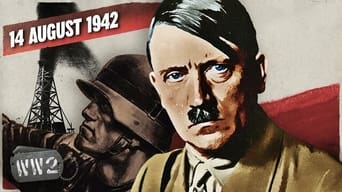
Week 154 - Guadalcanal - Allies Take the Initiative - August 7, 1942
Episode number: 35
Overview: The Axis Forces are on the move on the Eastern Front and in the Caucasus, but this week the Allies begin an offensive of their own: this week come Allied landings and attacks on Guadalcanal and nearby islands, the first American offensive against the Japanese.

Week 155 - No Soviet Oil for Hitler - WW2 - August 14, 1942
Episode number: 36
Overview: The Axis advance into the Caucasus is going great... except the oil towns they take have no oil, and wasn't that the whole purpose? Meanwhile in the Pacific, the US Navy is suffering perhaps its greatest defeat ever off Savo Island, even as the Marines take Tulagi, Gavutu, and Tanambogo.
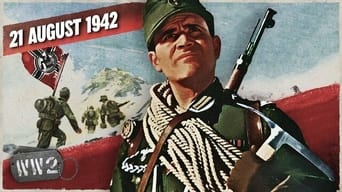
Week 156 - Swastika Raised on Highest Point in Europe - WW2 - August 21, 1942
Episode number: 37
Overview: The Axis advance in the Caucasus takes Mt. Elbrus, and the one on Stalingrad continues, and there are several raids of note this week- a Japanese one on Guadalcanal is destroyed, an Allied one on Dieppe is badly savaged, and an American one at Makin Atoll is successful in the short term, but with bad long term ramifications.
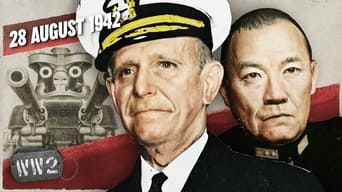
Week 157 - Yamamoto: Midway Round Two? - World War Two - August 28, 1942
Episode number: 38
Overview: The Battle of the Eastern Solomons takes place this week- another carrier battle. As for the Germans, they're advancing on Stalingrad, slowing down in the Caucasus, and Erwin Rommel is preparing to launch another assault in North Africa.

Week 158 - This War is Three Years Old - WW2 - September 4, 1942
Episode number: 39
Overview: As the war turns three there is is no slacking in the fighting. Erwin Rommel launches another Axis attack in North Africa, but it is foiled in only days, though the Axis are advancing in the Caucasus as well as on Stalingrad, where the fight for the suburbs is now beginning. They're also advancing in the South Pacific, as the Japanese fight their way along the Kokoda Trail.

Week 159 - Hitler Finally Fed Up with his Army - WW2 - September 11, 1942
Episode number: 40
Overview: Adolf Hitler sacks Wilhelm List, Army Group Commander in the Caucasus. His replacement does not have military command experience. The fighting there is still successful this week, though, as is the advance through the suburbs of Stalingrad. The Japanese are advancing along the Kokoda Trail and on Guadalcanal, but the Axis attacks in North Africa have failed badly.

Week 159B - Stalingrad, Hitler's Obsession - WW2 - September 13, 1942
Episode number: 41
Overview: Here's an extra weekly episode for you. The suburbs of Stalingrad have fallen and the fight for the city proper is about to begin, but before it does, three conferences take place that will decide the scope, the tactics, and the strategy of this battle.

Week 160 - Stalingrad Falls? - WW2 - September 18, 1942
Episode number: 42
Overview: It's a big week, but by now they all are. The fighting in Stalingrad is intense, the fighting on Guadalcanal is intense, and the US loses a carrier in the Pacific. And the German quest for oil in the Caucasus... how's that going again?

Week 161 - Stalingrad, Factory by Factory, Room by Room - WW2 - September 25, 1942
Episode number: 43
Overview: Franz Halder, German Army Chief of Staff since the war began, loses his job this week, but the offensive this summer has failed to gain any of its objectives and someone has to take the blame. In the Caucasus it's slowing to a crawl, and in Stalingrad the fighting is now block by block. Meanwhile, the Japanese are making new plans for a big offensive of their own, to take Guadalcanal once and for all.

Week 162 - This is Russia, The Soviet Thermopylae - WW2 - October 2, 1942
Episode number: 44
Overview: The fighting for Stalingrad continues, but the Soviets forces are split and the Volga is on fire. In the Caucasus, the Axis forces for the most part are being held in check- at one point a single Soviet battalion holds off an entire Army Corps- but they're being pushed back on the Kokoda Trail in the South Seas.

Week 163 - Stalingrad Thunderdome: Paulus vs. Chuikov! - WW2 - October 9, 1942
Episode number: 45
Overview: Things are looking pretty grim for Vassily Chuikov's 62nd Army in Stalingrad this week, as the German 6th Army launches its biggest series of attacks so far. The Axis are unable to get anywhere in the Caucasus, though, and the American Marines win a local victory over the Japanese on Guadalcanal, but everyone's thoughts there are on reinforcing and more reinforcing.

Week 164 - Stalingrad, Stalingrad, No Retreat! - WW2 - October 16, 1942
Episode number: 46
Overview: The Americans win a naval victory off Guadalcanal and even manage to reinforce the Marines there with the first Army units to arrive, but as the week ends the Japanese launch a major offensive on the island. Meanwhile far across the globe, Adolf Hitler orders that all German offensive operations except those at Stalingrad and in the Caucasus cease. There is plenty to do in Stalingrad, though, because this week all hell breaks loose there.

Week 165 - Showdown at El Alamein - WW2 - October 23, 1942
Episode number: 47
Overview: Could this be the beginning of the big break in North Africa? The Allies have the men, the armor, and the fuel... they just have to deal with the Axis minefields to try and get started. And the Axis are throwing ever more men at Stalingrad as the Soviets grimly hold on. Another roller coaster of a week.

Week 166 - Nazi General Dies of Heart Attack - WW2 - October 30, 1942
Episode number: 48
Overview: The Allies may be on the verge of a breakthrough in North Africa, but they're losing at sea to the Japanese this week, and the Axis are also advancing in the Caucasus, though the street by street struggle at Stalingrad continues as always.

Week 167 - The Allies Break Through! - WW2 - November 6, 1942
Episode number: 49
Overview: After all these months of fighting, the British 8th Army breaks through Erwin Rommel's Axis positions in North Africa, but the Allies have even bigger plans for that theater of war- a huge invasion of Vichy French North Africa to take place next week. The Soviets also have a plan for a huge invasion to take place very soon near Stalingrad, though the fighting in the city itself sees a lull the second half of this week.

Week 168 - Axis and Allies Both Invade France - WW2 - November 13, 1942
Episode number: 50
Overview: Operation Torch goes off this week, the Allied invasion of French Northwest Africa, but this prompts the Germans to invade European France. This is the Allies first combined major offensive in the Western Hemisphere. The Germans launch another offensive of their own this week, though- Operation Hubertus in Stalingrad. And in the South Pacific, a major naval battle begins off Guadalcanal.

Week 169 - The Red Army Kicks Ass - Operation Uranus! - WW2 - November 20th, 1942
Episode number: 51
Overview: After months of stubborn defense the time has finally come for the Soviet Counterstroke, but is it in time to save Stalingrad? And can the Allies reach Tunis and take all of North Africa before the Axis can reinforce?

Week 170 - Bigger Than Uranus? - Mars - WW2 - November 27, 1942
Episode number: 52
Overview: Last week’s counterattack was just the beginning, for the Soviets launch another giant offensive this week. And things look bad for the Axis powers in the south of the USSR. Meanwhile in France, the French scuttle their navy rather than allow it to fall into German hands.

Week 171 - Axis Armies Facing Starvation - WW2 - December 4, 1942
Episode number: 53
Overview: The Soviets have launched offensives on the entire eastern front and by now hundreds of thousands of men are surrounded at Stalingrad. The Japanese win a battle at sea, but are losing a war of attrition.

Week 172 - One Year Since Pearl Harbour - WW2 - December 11, 1942
Episode number: 54
Overview: The Japanese try and fail to supply their starving soldiers. The Allies fail to break through in Tunisia and New Guinea. The fighting in the USSR is bloody, but the Axis prepare for a new offensive there.

Week 173 - Guadalcanal Life Expectancy: 30 Days - WW2 - December 18, 1942
Episode number: 55
Overview: Just a few weeks ago massive offensives were launched in North Africa and the Soviet Union, against the Axis. These operations and offensives have now morphed into fully fledged campaigns, and the nature of these theatres of the war has been transformed.

Week 174 - A Red Christmas - WW2 - December 25, 1942
Episode number: 56
Overview: The Soviet offensive Operation Mars is over; it has failed, but Operation Little Saturn has been such a success that the Axis are forced to cancel their own Operation, Winter Storm, which was to relieve the troops trapped in Stalingrad. They remain trapped because Adolf Hitler has now forbidden them from trying to break out. The Allies run into tough Axis defense in both Tunisia and on Guadalcanal, and a French bigwig is assassinated.